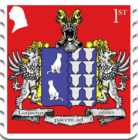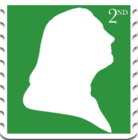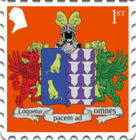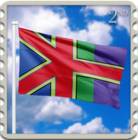Kingdom of Kohlandia
| Motto: Loquetur pacem ad omnes ("Speak peace unto all") | |
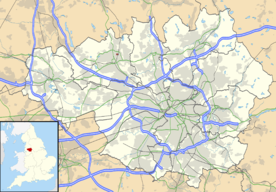 Approximate position of Kohlandia (not to scale) | |
| Capital | Dunhallow[1] |
| Largest city | Dunhallow |
| Official languages | English, Esperanto, Latin |
| Demonym(s) | Kohlandian |
| Government | Constitutional Monarchy |
• Monarch | Catherine I |
• Prime Minister | Crown Princess Elizabeth |
• Chancellor | Vacant |
| Legislature | Direct Democracy |
| Establishment | 30 August 2019 |
| Population | |
• Census | 10 (as of 2019 Census) |
| Currency | Quid |
| Time zone | UTC (Current time: 08:40) update |
Website Official website | |
Kohlandia, officially the Kingdom of Kohlandia, is a European micronation landlocked within Greater Manchester, United Kingdom. It was founded on 30 August 2019 by Queen Catherine the First, the nation's head of state. Its capital is Dunhallow,[1] which lies approximately 12 miles from Manchester city centre. Kohlandia shares a border, and administrative control over a region of land, with the Empire of Jennytopia.
Kohlandia is a simulationist micronation founded on a principle of "loosely-checked direct democracy". Its government's legislative arm is composed of all eligible adult citizens, who can introduce and vote on all legislation within the micronation. It has an elected Prime Minister, who runs the executive branch of the Government, and an elected Speaker of the House, who administers the legislative wing.
Etymology
The name "Kohlandia" is derived from two sources. The primary source is the Germanic word kohl ("cabbage"), and refers to the fact that a large portion of Kohlandia had been used to grow cabbages for several years prior to the founding of the kingdom. The country's name can therefore be translated to "cabbage land".
The second, and more apocryphal, derivation is the Kohlandian folklore character "April Kohl", who is a gardener and sometimes described as the embodiment of a model Kohlandian. In this version, the country's name would translate as "Kohl's Land".
History
Kohlandia has existed in various forms since 2014 but officially declared independence and became a micronation in 2019. The nation is an example of a geopolitical roleplaying idea being able to form into a real-world entity, with accompanying governmental and legal structures. As such, it is an example of a nation that counters the concept of there being an insurmountable divide between geofiction and micronationalism.
Pre-Independence Era
Kohlandia began as a roleplaying exercise on the geopolitical game NationStates, where it was created by Catherine Robinson, an active participant in the long-running roleplaying game based around the NationStates region of the East Pacific. This version of Kohlandia developed a rich backstory with multiple characters and a working roleplaying economy, all of which would later feed into the basis of the nascent micronation.
It was during the NationStates era that Kohlandia developed its flag, then called the Flyggen Vereini,[2] (translation: "Flag of the Union") plus a Kolandian constructed language known as Thursian.[3] The name of the Kohlandian capital, Dunhallow, also comes from this era but the reliance on Old English rather than Thursian to name the capital city demonstrates how quickly the idea of a constructed language for the country was phased out.
Modern Kohlandia
In 2019, Catherine became disenchanted with the state of national politics in the United Kingdom, having seen how the British Parliament was so adamantly against respecting the views of the British people. She decided that a new form of democratic representation was the only way to sort out the problem, and to that end, she decided to show that modern technology could provide that representation. Catherine took her NationStates nation of Kohlandia and worked it into a version that could demonstrate how effectively her views on true democracy could function in a modern nation.

She decided to build Kohlandia as a constitutional monarchy in which the Parliament would be formed from all adult citizens rather than a select few. Kohlandia was formally founded on 30 August 2019, following a declaration of secession from the United Kingdom. In order to maintain a form of balance that will hopefully prevent a "tyranny of the majority" from trampling over minority rights, Queen Catherine instituted a veto system into the Kohlandian Constitution, whereby Royal Assent must be granted before any legislation voted on by the Kohlandian Parliament can become law.
Queen Catherine instituted a Kohlandian flag, a coat of arms, designed the first stamps and currency, and began work on the first draft of the Kohlandian Constitution between 30 and 31 August 2019. She also developed the Kohlandian official website, which is the hub for Kohlandian culture and democracy, and founded the first Kohlandian companies: The Daily Micronationalist and Radio Kohlandia.
Queen Catherine created the Privy Parliament on 1 September 2019, to assist with drafting the Constitution and to begin preparing what laws may be necessary to get Kohlandia functioning. The drafting process was completed on 25 October and the Queen with the Privy Parliament presented the draft Constitution to the Kohlandian citizenry.[4]
“This document represents many gruelling hours of work for our new nation. It is now presented to the people of Kohlandia for their inspection and a decision on whether to accept it as our Constitution.”
— HM Queen Catherine I, The Daily Micronationalist, "Kohlandia Puts Constitution to a Referendum"
The Privy Parliament announced the Referendum on the Kohlandian Constitution at this ceremony, with the ballot closing at 12:01PM on 4 November 2019. The Daily Micronationalist reported the results of the referendum that same day, with 80% of citizens voting to accept the draft Constitution.[5] Immediately upon the referendum result being announced, HM Queen Catherine disbanded the Privy Parliament and established the full Kohlandian Parliamentary system.
The first matter brought to the Kohlandian Parliament was a Bill proposing that Kohlandia apply for Observer status at the Grand Unified Micronational. This Bill passed on 22 November 2019 with a vote of 3:0 in favour and received Royal Assent on 23 November 2019, becoming the Grand Unified Micronational Application Act 2019. The Act was later amended to include ratification of the GUM Charter, via the Grand Unified Micronational Application (Amendment) Act 2019, which also received Royal Assent on 23 November 2019.[6] Kohlandia was voted into the GUM as an Observer on 27 November 2019.
Kohlandia announced the candidates for its first general election on 27 November 2019.[7] Crown Princess Elizabeth and Queen Consort Jennifer stood for election as Prime Minister, while Queen Consort Jennifer and Queen Catherine I stood for election as Speaker of the House.[7] The ballot closed at midnight on 1 December 2019, with HRH Crown Princess Elizabeth elected as the first Kohlandian Prime Minister and HM Queen Catherine I elected as the first Speaker of the House.[8]
Geography
Kohlandia occupies a rectangle of land approximately 9 square metres in size known as the Cappanuke Region, plus a 1/4 hectare of territory called Gardinia, which it shares governance over with the neighbouring Jennytopia. Kohlandia is bordered to the west by the Empire of Jennytopia, and by the United Kingdom on all other sides.
The principle area of the Cappanuke region is Dunhallow, the Kohlandian capital. Dunhallow is home to the seat of Kohlandian government, as well as the main server bank that acts as the primary source of Kohlandian media. Dunhallow plays host to the computer system used for The Daily Micronationalist, which is also written and edited from Dunhallow. The server bank is also home to the video, audio and editing equipment that is used for the majority of Kohlandia's media output.
Gardinia is home to Kohlandia's main agricultural business and also houses the Kohlandian Air Force. A dry dock for the joint Kohlandian-Jennytopian navy is also in Gardinia, where repairs and maintenance to Navy assets can be undertaken.
Climate
As a northern country in the British Isles, Kohlandia experiences a temperate climate with warm summers and cool winters. It enjoys the same average weather as its larger neighbour, England. Kohlandia imports its meteorological data from England, as it does not currently have the facilities to perform such monitoring work on its own.
| Average Weather in Kohlandia | ||||||||||||||
|---|---|---|---|---|---|---|---|---|---|---|---|---|---|---|
| Month | Jan | Feb | Mar | Apr | May | Jun | Jul | Aug | Sep | Oct | Nov | Dec | Year | |
| Average maximum temperature °C (°F) |
6.4 (43.5) |
6.6 (43.9) |
9.1 (48.4) |
11.8 (53.2) |
15.6 (60.1) |
18.6 (65.5) |
20.4 (68.7) |
20.1 (68.2) |
17.5 (63.5) |
14.0 (57.2) |
9.4 (48.9) |
7.3 (45.1) |
13.1 (55.6) | |
| Average minimum temperature °C (°F) |
1.2 (34.2) |
0.9 (33.6) |
2.0 (35.6) |
3.9 (39.0) |
6.8 (44.2) |
9.7 (49.5) |
11.7 (53.1) |
11.5 (52.7) |
9.6 (49.3) |
7.2 (44.5) |
3.6 (38.5) |
2.0 (35.6) |
5.9 (42.6) | |
| Sunshine hours |
54.2 | 74.3 | 107.6 | 155.2 | 190.6 | 182.6 | 193.5 | 182.5 | 137.2 | 103.1 | 64.5 | 47.3 | 1492.7 | |
| Rainfall mm (inches) |
82.9 (3.3) |
60.3 (2.4) |
64.0 (2.5) |
58.7 (2.3) |
58.4 (2.3) |
61.8 (2.4) |
62.6 (2.5) |
69.3 (2.7) |
69.7 (2.7) |
91.7 (3.6) |
88.2 (3.5) |
87.2 (3.4) |
854.8 (33.7) | |
| Rainfall ≥ 1 mm days |
13.2 | 10.4 | 11.5 | 10.4 | 9.9 | 9.6 | 9.5 | 9.9 | 9.9 | 12.6 | 13.1 | 12.7 | 132.8 | |
| Source: United Kingdom Met Office[9] (1981–2010 averages), via Wikipedia | ||||||||||||||
Culture
Kohlandia prides itself on its diverse culture, which is greatly fond of the art, film, and television it produces. Kohlandia is home to, or contains local offices of: a web TV production company; a book publishing company; a comic art studio; and a comedy group. The National Art Gallery attracts several visitors each month, while the video gaming museum draws regular praise from attendees.
Art
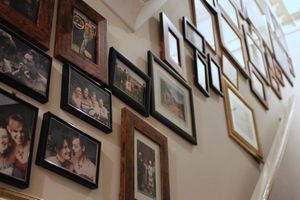
Queen Catherine is a keen artist with a love of painting, cartoon drawing, and writing. Her wife, Princess Jennifer, is a noted writer and web television creator. Together they have become keen patrons of the arts, producing several artistic works that are displayed both online and in Kohlandia's National Art Gallery, located in the Cappanuke Region near Dunhallow.
Artistic endeavour is actively encouraged in Kohlandia and it makes up a significant proportion of the Kohlandian economy as a result. Kohlandia is the home of three comics, and pre-independence Kohlandia was the filming location for two short films, with six more planned for the future. Kohlandia's first book publishing company has three books due to be published in 2019-20, and its web television station is currently developing six new series.
April Kohl
Kohlandia's artistic and media output often includes a figure called "April Kohl", or a reference to her. April is a popular figure in Kohlandian folklore, where she is regarded as a young lady who lives on a farm, usually growing cabbages. She is wise beyond her years and happy to help those who seek her aid. Her usual companion is a grumpy cat, called Fred.
Kohlandiaball
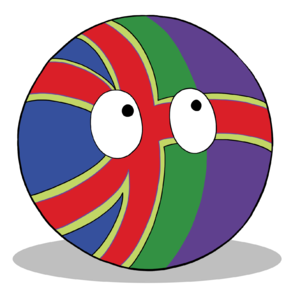
The Kohlandiaball, also known as the Kohlball, is the microball representing Kohlandia. It is commonly depicted in a confused manner, mimicking Kohlandia's apparent inability to understand what countryballs are actually for. The first Kohlandiaball was drawn by HM Catherine I on 29 September 2019 and distributed via the MicroWiki Discord server.
Kohlandiaball received strong criticism upon its release, with the majority of detractors stating that the design varied too greatly from the standard countryball design. HM Queen Catherine defended the decision to give Kohlandiaball pupils and make its eyes more expressive, stating that she "wanted to humanise the country". Despite the criticism, Kohlandiaball has retained its look for Microball Moments, the comic strip it is now featured in.
Citizenship
The Kohlandian Constitution allows the Crown to grant citizenship by royal prerogative. The Prime Minister may also grant citizenship, subject to Kohlandian law, as can a Minister appointed to do so by the Prime Minister,[10] although it does not come with residency rights. The constitution also grants automatic citizenship to children born to Kohlandian parents, or to parents where only one parent is Kohlandian, regardless of which parent holds Kohlandian citizenship.[10]
Citizens of Kohlandia are automatically granted the right to attend Parliament, bring draft legislation to Parliament, participate in Parliamentary debates, and vote on legislation in Parliament when they reach eighteen years of age.[10] This right can be suspended for a period of time (usually because the citizen is a member of the Judiciary, who are forbidden from taking part in the Parliamentary process, or because the citizen is subject to criminal sanction through the courts) but the rights are automatically restored once the circumstances barring participation are no longer in effect.[10]
Honorary Citizenship may be granted to non-Kohlandians via an Act of Parliament. This does not grant the rights enjoyed by Kohlandian citizens, such as voting rights, and is regarded more as a form of the honour system that Parliament can bestow.
Holidays and celebrations
Although Kohlandia is a relatively new nation, it still has several holidays and celebrations that are important to Kohlandian culture.[11] These are:
- Norton Day (4 February), when Kohlandians celebrate the birth of Emperor Norton I, the self-styled Emperor of the United States
- Ed Balls Day (28 April), when Kohlandians celebrate the Internet meme of "Ed Balls, Ed Balls".
- Kohlandia Day (30 August), when Kohlandians celebrate their independence from the United Kingdom
- Catherine Day (20 September), when Kohlandians celebrate the birthday of Queen Catherine, the nation's founder.
Catherine Day is the day new honours are traditionally bestowed on important Kohlandians, as well as notable or influential supporters of Kohlandia. The number of honours bestowed in any given year is not set, nor are the categories from which honours are given out. Kohlandians may nominate potential recipients for an honour but that person receiving an honour is not an automatic process after nomination. Each nomination is examined for its merit before a final decision is made on whether the nominee should receive an honour, and what level of honour they should receive.
Language
English is the de facto language of Kohlandia, although the Constitution recognises English, Latin and Esperanto as the country's national languages.
English is the most widely spoken of the three national languages, with the overwhelming majority of Kohlandians speaking English fluently. Kohlandia adopted Esperanto "as a gesture of hope that the peoples of the world can one day come together in peace and harmony" but most Kohlandians are not at all fluent in it. Latin, on the other hand, is regularly used in Kohlandian media but is not a commonly-spoken language by the Kohlandian populace.[12]
Media
Kohlandia is home to a small but growing web television and film industry, with many of its programs being patronised by, produced by or starring members of the Kohlandian Royal Family. Kohlandia formed its first television network, run by the Kohlandian Television Corporation, on 3 October 2019. The channel, KTV planned to begin broadcasting in November 2019 but has yet to begin.
In addition to KTV, Kohlandia is home to a branch of the UK company All Mouse Media Ltd, which produces web television, films, comics and books. All Mouse Media is best known for its web TV shows Jenny Kirk (which is filmed primarily in Kohlandia and Jennytopia) and GameHammer (which is filmed primarily in Kohlandia).
Kohlandia has no national newspapers but The Daily Micronationalist newspaper is published from Dunhallow, Kohlandia's capital city.[13] The newspaper also publishes Microball Moments,[14] a comic strip written and drawn by HM Queen Catherine and featuring the Kohlandiaball character.
Radio Kohlandia began broadcasting in podcast form on 27 September 2019, with a short pilot episode of Catherine's Chats, a talk show hosted by Queen Catherine. The pilot episode was made in and broadcast from Dunhallow, in order to test the broadcasting equipment in the capital.[15]
Population
The 2019 census, conducted on the date of secession from the United Kingdom, recorded 10 people with Kohlandian citizenship, two of whom are permanent citizens in the nation.
Religion
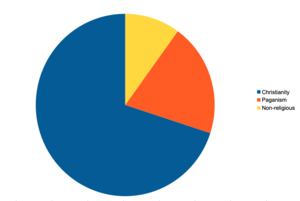
The Constitution of Kohlandia does not acknowledge any religion as its national religion. It regards a clear division between religion and government as a constitutional requirement. However, Kohlandia also practices freedom of religion. Citizens are able to practice whichever religious beliefs they choose to, so long as those beliefs and practices do not violate any Kohlandian laws.
At the last national census, Kohlandia was home to three main religious groups: Christians (70% of the population), Pagans (20% of the population, split equally between Wicca and neopaganism), and non-religious people (10% of the population).
HM the Queen is known to follow Wicca, while other members of the Royal Family are predominantly Christian.
Sport
Although Kohlandia is small, it is nevertheless home to sports fans. The national sport is ice hockey (the Queen is said to be very fond of the St Louis Blues), while chess and backgammon are also very popular in the nation.
Time Zone
Although Kohlandia is situated within the British Isles, it has always maintained its own timekeeping facilities. Kohlandia adopted Greenwich Mean Time as its time zone upon the founding of the kingdom but refused to accept the principle of altering the time during the summer, with HM Queen Catherine I claiming "this is an outdated concept that no longer serves any real purpose". Kohlandia is therefore permanently on GMT/UTC, which puts the nation 1 hour behind the rest of the British Isles for six months of the year.
Government
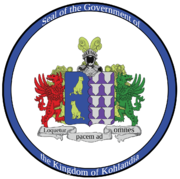
The Government of Kohlandia is split between three branches: the executive, run by the Prime Minister; the legislative; and the judiciary. The judiciary is required by law to remain separate from the legislative and executive branches, with judges being barred from taking part in parliamentary proceedings during their time in office.
The executive and legislative branches are separate in most aspects but every member of the executive may take part in activities of the legislative branch, and members of the Executive Cabinet are chosen from the legislative branch by the Prime Minister. The Prime Minister also assists the Speaker of the House in setting the timetable for the parliamentary year, to ensure the smooth running of Parliament and to ensure there is as little overlap between expected executive and parliamentary legislation as possible.
The Crown, in its roles as the Monarch in Cabinet and/or the Monarch in Parliament, is entitled to take part in both executive and parliamentary functions. The Crown is forbidden under the Constitution from interfering with the deliberations of the judiciary, however.
Kohlandian Royal Family
The Crown is the constitutional head of state in Kohlandia, with the office occupied by the reigning Monarch. Kohlandia's Royal Family is at present headed by Queen Catherine, with her wife, Queen Consort Jennifer, Empress of Jennytopia and Grand Duchess of Dunhallow, acting as her main advisor. Due to the Queen having no children, the heir apparent is currently Crown Princess Elizabeth, and her heir presumptive is her eldest child, Princess Molly.
Succession in Kohlandia is not dependent on gender; both men and women can become Monarch. However, the line of succession goes in age order, through blood relatives, and primacy is to continuation via descendant family. As a result, if the Queen does have a child in the future, the line of succession will move to that child and their offspring, if they have any.
Parliamentary system
Kohlandia is a constitutional monarchy with the Queen as the head of state and a written constitution.[10] Citizens elect a Prime Minister, who chooses his or her executive cabinet, comprised of Ministers of State. All citizens are eligible to stand for election as Prime Minister when they reach 21 years of age.[10] The Prime Minister is elected for a five-year term and appoints Ministers to his or her Executive that can last in post for that entire term, or for a shorter period at the Prime Minister's whim. Any extant Ministers leave office automatically when the Prime Minister's period of office is up. Prime Ministers may serve for a maximum period of three terms, which need not be consecutive.[10]
The legislative arm of the government, the Kohlandian Parliament, is made up of all eligible adult citizens aged eighteen or more and legislates via direct democracy in secret ballots. The executive sets the primary legislative agenda but individual citizens have the right to propose legislation during time set aside in the parliamentary session.[10] The Parliament is administered by the Speaker of the House, who sets the timetable for the parliamentary year in tandem with the Prime Minister. The Speaker then conducts the day-to-day administrative functions of the Parliament, as well as moderating disputes between members of the legislature.
The Speaker of the House is elected for a four-year term. Speakers may serve for a maximum period of three terms, which need not be consecutive. All citizens are eligible to stand for election as Speaker of the House when they reach 21 years old.[10]
Political parties
Kohlandia has no recognised political parties. Due to the nature of the direct democratic system, it is individual views and politics that are of the highest importance in Kohlandia rather than an adherence to any specific political system or party. Nevertheless, parties are not outlawed in Kohlandia and it is expected that, as the population and the parliamentary system develops in the nation, political parties (either unique to Kohlandia or based on parties already active abroad) will likely develop.
Ministries
The size of the Kohlandian Cabinet is subject to the needs identified by the Prime Minister. Standard Ministries that all Prime Ministers can be expected to appoint Ministers to are:
- Deputy Prime Minister
- Chancellor
- Foreign Office
- Home Office
- Chief Attorney
In addition, Ministries covering the Justice, Culture, Sport, Media, Sciences, Planning & Development, Equalities, and Agriculture portfolios can be expected, but whether each of these portfolios will be given to individual Ministers or combined into a larger Ministry will depend largely on how important the current Prime Minister believes those portfolios will be during his or her tenure.
Cabinet Ministers are appointed from members of the legislature, which is composed of all eligible adult citizens. Appointment to the Cabinet is under the gift of the Prime Minister and neither the Crown nor the legislature need be consulted on the appointments.
Royal Veto, and Veto Override Procedure
The Monarch may engage in political debate and vote in the legislature but their vote carries the same weight as that of any other citizen. All laws, when accepted by the Parliament in a free vote, must then be submitted to the Crown for Royal Assent.[10] This is not an automatic process, as the Crown may choose to veto any legislation sent for its approval, with or without giving a reason.
Where Royal Assent is not granted, the legislation returns to Parliament. That legislation then cannot be re-submitted to a vote for a period of one year, after which it will automatically become law, without the need for Royal Assent, if passed by the Parliament with a supermajority voting in favour. This is known as the royal veto override procedure.[10]
Economy
Currency
The Kohlandian currency is the Quid (symbol: kQ), which is tied to the value of the Linden Dollar (symbol: L$) via the rate of L$100 to kQ1. This gives an approximate exchange rate of £0.26 to kQ1. The Quid is a decimalised currency and is subdivided into pennies (symbol: kp). There are 100kp to kQ1, which gives an exchange rate of L$1 to 1kp; or approximately 1 British pence to 3.85kp.
Kohlandia operates a predominantly electronic currency system, although it does issue commemorative notes and coins, which are considered legal tender. The most common notes are the kQ5 and kQ10, although kQ20, kQ50 and kQ100 notes do also exist. It issues 5kp, 20kp, 50kp, and kQ1 coins.
-
Kohlandian 5 Quid note -
Kohlandian 10 Quid note -
Kohlandian 20 Quid note -
Kohlandian 50 Quid note -
Kohlandian 100 Quid note
Imports and exports

Kohlandia's main export is fruits and vegetables, including apples, carrots, figs and the cabbages that the country gets its name from. These are grown organically and in low numbers, although economic reports for the past decade show the crop yields are increasing year-on-year with the introduction of new farming techniques.
Kohlandia's main import is electricity, as the country does not yet produce any of its own. Plans are being drawn up to introduce renewable energy systems to the nation but these are still at a very early stage, as there are concerns about the impact such systems may have on Kohlandia's limited farming space.
The main industry in Kohlandia is the media. Kohlandia is home to a newspaper, a book publishing company, a comic studio, and a small TV & film company which releases its main productions on the Internet. The country is home to five YouTube channels, which it broadcasts on in preference to launching any television stations. The Kohlandian government is planning to introduce a state-backed web television and web radio statio, and Radio Kohlandia began test broadcasts on 27 September 2019.
Post Office
Kohlandia has a small, internal post office that can accept internal mail only. It produces its own stamps, including special commemorative designs for key events in the nation's history.
-
Kohlandian 1st Class stamp, issued 2019 -
Standard Kohlandian 2nd Class stamp -
Commemorative 1st Class stamp, issued 2020, celebrating 1 year of independence -
Kohlandian 1st Class stamp, issued 2020 -
Commemorative 2nd Class stamp, issued 2021, celebrating 2 years of independence
Law and order
Police
Currently, the police in Kohlandia are structured by a Royal Decree dated 3 September 2019, which was passed in preparation for the enactment of the first Kohlandian Constitution. Following the enactment of the Constitution, the current structure and role of the Police are expected to continue as laid out at present unless and until Parliament enacts a Police Act of some form.
Law enforcement within Kohlandia is split into two divisions, with the Kohlandian Police being responsible for internal Kohlandian matters while the Kohlandian Border Police is responsible for immigration and border-related matters. The Police and Border Police both report to the Minister of the Executive Branch of the Kohlandian Parliament who holds the Justice portfolio; often the Home Office Minister but not always, at the discretion of the Prime Minister.
The primary duties of the Kohlandian Police are, of course, law enforcement, although the maintenance of public order and crime prevention are also high priorities. The primary duties of the Kohlandian Border Police are the prevention of illegal immigration; the prevention of smuggling (both goods and people); and the maintenance of border security.
Ranks within the Kohlandian Police and Border Police are:
| Police | Commissioner | Chief Inspector | Inspector | Sergeant | Constable |
|---|---|---|---|---|---|
| Border Police | * | Chief Inspector | Inspector | Sergeant | Constable |
* There is no Commissioner role in the Border Police and the Chief Inspector instead answers to the Police Commissioner for Dunhallow.
Crime in Kohlandia is very rare, so Kohlandian police are part-time officers who often work additional jobs in conjunction with their law enforcement roles.
Judiciary
The justice system in Kohlandia was created by Royal Decree on 3 September 2019 and was further documented in the draft Kohlandian Constitution. With the Constitution now signed, the structure and function of the judiciary and the courts are expected to continue without change unless and until Parliament drafts Acts to change them.
Kohlandian jurisprudence operates on a civil law system founded on a negative law system; i.e. actions are only forbidden if a law specifically prohibits them.
Criminal matters are tried within the Criminal Court system, with crimes initially being tried in the Crown Courts. Civil matters are heard in the Civil Court system, with matters initially being heard in a Town Court. In both instances, appeals may be made to the High Court, which may hear appeals on matters of law or of fact. Further appeals can then be made to the Supreme Court, which may hear appeals on matters of law only.
Judges in the Kohlandian court system are appointed by the Crown by Royal Prerogative, or by Parliament by an Act of Parliament. Once appointed, Judges may sit for a period of 10 years, after which they may request to continue in their role for another 10 year term. This request may be granted by Parliament, via a standard majority vote.
Due to the rarity of crime and civil dispute in Kohlandia, courts do not sit all year 'round and are instead convened on an as-needed basis. The sanction and/or punishment for any crime or civil issue are as defined in the Constitution or Act of Parliament that created the crime or basis for the civil suit in question.
Military
Kohlandia has a small army, which it maintains solely for self-defence purposes. Despite being landlocked, Kohlandia maintains a navy, which it regularly deploys on exploration, peace, and diplomatic missions. Kohlandia also employs an air force consisting of drones. It is working on a space program for scientific research. The Kohlandian military is headed by the Monarch as the Commander in Chief, as per Article 10 of the Kohlandian Constitution.[10]
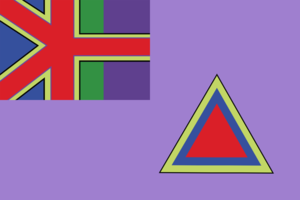
The Kohlandian Air Force (KAF) is the most regularly-deployed branch of the military, with numerous exploratory missions having been conducted since the founding of the nation. Kohlandia maintains that its deployment of air force equipment is always peaceful and primarily research-based, with the majority of the missions having been used for aerial reconnaissance of Gardinia, as well as for airborne inspection of Kohlandian structures.
The Kohlandian Navy consists primarily of one vessel that was originally designed and built for the British Royal Navy, and which is stationed in dry dock in Gardinia for most of the year. When deployed, this vessel is used for diplomatic and research missions only, as part of Kohlandia's cultural desire to encourage peaceful relations with its neighbours.
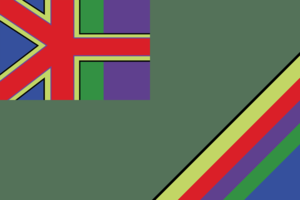
The Kohlandian Army is the smallest branch of the military and exists for purely ceremonial reasons. Kohlandia has expressed no desire to become aggressive toward its neighbours and, thanks to its size, sees no purpose outside of ceremonial matters to obtain a standing army, even for self-defence purposes.
The Kohlandian Space Force (KSF) was founded on 30 March 2020, following the passage of the Kohlandian Space Force Inauguration Act 2020.[16] The KSF will be an organisation formed primarily for scientific research and exploration, along the same structural lines as the Air Force. There are no plans for any manned missions from the KSF at this time and all documentation regarding the KSF's first planned missions are solely focused on unmanned craft.
Foreign relations
Foreign relations and diplomacy are conducted by the Crown, who may at their discretion pass some or all of the role on to the Prime Minister. In turn, the Prime Minister will dispense much of the role to the Foreign Office. Request for treaties, trade deals and other diplomatic matters should be conducted via the Foreign Office in the first instance.
State receptions in Kohlandia are often conducted by the Crown and the Prime Minister together, although the Crown is free to conduct these without the need for the Prime Minister to be present, where that is deemed necessary or appropriate.
Treaties
As a new nation, Kohlandia's established foreign relations are limited so far but some agreements, treaties and mutual recognition agreements have been drawn up. Kohlandia has opened formal dialogues with several nations, as a precursor to establishing diplomatic relations.
Kohlandia has signed a peace treaty; a trade deal; and a mutual cooperation agreement with the neighbouring micronation of Jennytopia. This agreement includes the shared governance of land situated between the two nations; shared use of military facilities; and mutual cooperation on construction projects. Prior to the establishment of this agreement, Kohlandia and Jennytopia had engaged in a power struggle for control of the disputed land of Gardinia, which exists between the two micronations. During talks to secure a treaty, a mutual recognition and cooperation pact was signed by Queen Catherine and Empress Jennifer. This pact established the borders of both Kohlandia and Jennytopia, as well as setting in place an agreement to co-govern Gardinia.
Kohlandia has signed a Treaty of Mutual Recognition with the Empire of Aenopia.[17] This treaty formally recognises the internal political structure of the two nations; agrees on their mutual sovereignty; acknowledges the lands and territories claimed by the two nations; and allows for the formal construction of Embassies. The treaty was signed by Queen Catherine, on behalf of Kohlandia, and Emperor Logan I, on behalf of Aenopia.
Kohlandia began talks to establish a mutual recognition treaty and formal diplomatic relations with Graustark on 27 September 2019. The Treaty of Mutual Recognition between the two nations was signed by Queen Catherine on 3 October 2019.
Recognition of other micronations
Kohlandia has formally recognised the following nations, along with the signing of a treaty and the establishment of diplomatic relations:
| Graustark |
|---|
Kohlandia recognises the following nations, although recognition does not necessarily equate to ongoing diplomatic ties, treaties, or other matters:
Kohlandia recognises and has opened a dialogue with the following nation, although formal diplomatic relations have not been entered into due to the policy of not establishing diplomatic relations of the other nation:
External links
- Official web site
- Official Discord Server (including where the Kohlandian Parliament is held)
- Official Twitter account
- Official Facebook page
References
- ↑ 1.0 1.1 Kohlandia Official Website, About page (accessed 17 September 2019)
- ↑ NationStates Wiki, Kohlandia (accessed 18 September 2019)
- ↑ NationStates Wiki, Thursian (accessed 18 September 2019)
- ↑ The Daily Micronationalist, "Kohlandia Puts Constitution to a Referendum" (accessed 25 October 2019)
- ↑ The Daily Micronationalist, "Kohlandia Accepts Constitution!" (accessed 13 November 2019)
- ↑ The Daily Micronationalist, "Kohlandian Parliament Passes First Legislation" (accessed 23 November 2019)
- ↑ 7.0 7.1 The Daily Micronationalist, "Kohlandia goes to the polls" (accessed 27 November 2019)
- ↑ The Daily Micronationalist, "Kohlandia Election Results!" (accessed 02 December 2019)
- ↑ "England averages". Met Office. 2012. Archived from the original on 10 April 2013. Retrieved 6 December 2012.
- ↑ 10.00 10.01 10.02 10.03 10.04 10.05 10.06 10.07 10.08 10.09 10.10 10.11 Kohlandia Official Website, Update on the Kohlandian Constitution (accessed 10 September 2019)
- ↑ Kohlandia Official Website, Holidays and Celebrations (accessed 09 September 2019)
- ↑ Kohlandia Official website, Languages (accessed 10 September 2019)
- ↑ The Daily Micronationalist, Welcome Page (retrieved 05 September 2019)
- ↑ The Daily Micronationalist, "Why I'm Leaving (Microball Moments)" (accessed 20 November 2019)
- ↑ The Daily Micronationalist, Catherine’s Chats, Episode 0 (accessed 27 September 2019)
- ↑ The Micronational Times, Kohlandia Founds Space Force! (retrieved 30 March 2020)
- ↑ 17.0 17.1 The Daily Micronationalist, Aenopia Establishes Treaty with Kohlandia (accessed 14 September 2019)
Available languages for this page:
• English |







